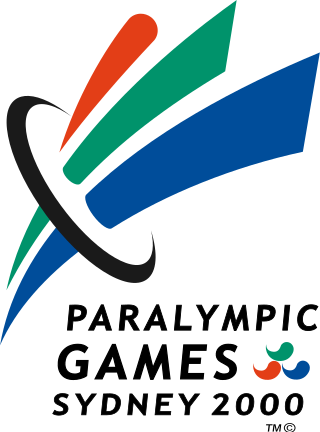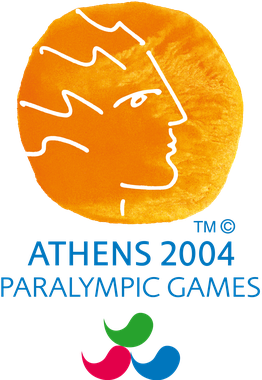| Men's 81kg at the XI Paralympic Games | |||||||||||||||||
|---|---|---|---|---|---|---|---|---|---|---|---|---|---|---|---|---|---|
| Venue | Sydney, Australia | ||||||||||||||||
| Competitors | 13 from 13 nations | ||||||||||||||||
| Medalists | |||||||||||||||||
| |||||||||||||||||
The men's 81 kg judo event at the 2000 Summer Paralympics . [1] [2]
| Men's 81kg at the XI Paralympic Games | |||||||||||||||||
|---|---|---|---|---|---|---|---|---|---|---|---|---|---|---|---|---|---|
| Venue | Sydney, Australia | ||||||||||||||||
| Competitors | 13 from 13 nations | ||||||||||||||||
| Medalists | |||||||||||||||||
| |||||||||||||||||
The men's 81 kg judo event at the 2000 Summer Paralympics . [1] [2]
| Round of 16 | Quarterfinals | Semifinals | Final | ||||||||||||||||
| 0150 | |||||||||||||||||||
| 0001 | 0000C | ||||||||||||||||||
| 1000S | 1010S | ||||||||||||||||||
| 1010 | 0001C | ||||||||||||||||||
| 0000 | 0001 | ||||||||||||||||||
| 0000 | 1010S | ||||||||||||||||||
| 1010 | 0000 | ||||||||||||||||||
| 0000 G | |||||||||||||||||||
| 0000 | 0221 | ||||||||||||||||||
| 0000S | |||||||||||||||||||
| 0000 | |||||||||||||||||||
| 0010 | |||||||||||||||||||
| 0000S | |||||||||||||||||||
| 0000 | 1001 | ||||||||||||||||||
| 1000 | |||||||||||||||||||
| First round | Second round | Bronze medal matches | ||||||||
| 1002 | 0010 | |||||||||
| 0010S | 0000 | 1000 | ||||||||
| 1012S | ||||||||||
| 0200 | ||||||||||
| 0100 | 1000 | 1000 | ||||||||
| 0001 | 0000 | 0000 | ||||||||
| 1000 | ||||||||||

The 2000 Summer Paralympic Games or the XI Summer Paralympics were held in Sydney, New South Wales, Australia, between 18 and 29 October. The Sydney Paralympics was the last time that the Summer Paralympics were organized by two different Organizing Committees. In this edition, a record 3,801 athletes from 120 National Paralympic Committees participated in 551 events in 18 sports, and until the 2006 Commonwealth Games held in Melbourne, it was the second largest sporting event ever until that date held in Australia and the Southern Hemisphere. Sydney was the eighth city to host the Olympics and the Paralympics on same venues at the same year, and the first since Barcelona 1992 that they were organized in complete conjunction with the Olympics. They were also the first Paralympic Games outside the Northern Hemisphere and also in Oceania.

The 2004 Summer Paralympics, the 12th Summer Paralympic Games, were a major international multi-sport event for athletes with disabilities governed by the International Paralympic Committee, held in Athens, Greece from 17 to 28 September 2004. 3,808 athletes from 136 countries participated. During these games 304 World Records were broken with 448 Paralympic Games Records being broken across 19 different sports. 8,863 volunteers worked along the Organizing Committee.

Libya competed at the 2000 Summer Olympics in Sydney, Australia. The country's participation in Sydney marked its sixth appearance at a Summer Olympics since its debut at the 1964 Games. The delegation included three male athletes; marathon runner Adel Edeli, judoka Tarek Ayad and Nizar Mohamed Naeeli in taekwondo. Edeli did not finish his race, while Ayad and Naeeli were both eliminated in the first bouts of their respective tournaments.

Anthony "Tony"Laurence Clarke,, is the only Australian Paralympic judoka gold medallist. He represented Australia at five Summer Paralympic Games and medalled at the 1993 Australian National Judo Championships competing against sighted opponents.

Paralympic judo has been contested at the Summer Paralympic Games since 1988. The sport is restricted to visually impaired competitors. Men's and women's events are held in various weight classes, just like judo at the Summer Olympics. More than 130 visually impaired judokas, including some from the United States, Canada, France, Germany, Greece, Spain and Sweden, competed in the Rio 2016 games, making it the biggest yet staged.

The medal table of the 2000 Summer Paralympics ranks the participating National Paralympic Committees (NPCs) by the number of gold medals won by their athletes during the competition. This was the eleventh Summer Paralympic Games, a quadrennial competition open to athletes with physical and intellectual disabilities. The Games were held in Sydney, Australia, from October 18 to October 29, 2000, the first time they had been held in the southern hemisphere. With 3,843 athletes taking part in the 18 sports on the programme, the Games were the second largest sporting event ever held in Australia. The location and facilities were shared with the largest event, the 2000 Summer Olympics, which concluded on 1 October. The Games set records for athlete and country participation, tickets sold, hits to the official Games website, and medals on offer.

Para Judo at the 2000 Summer Paralympics consisted of seven men's events.

The 1996 Summer Paralympics were held in the United States city of Atlanta. Australia competed in 13 of the 17 sports, winning medals in 10 of those sports. At the 1996 Summer Paralympics, Australia had the second highest medal tally of any country competing. It won 42 gold, 37 silver and 27 bronze medals. It surpassed the 24 gold medals that Australia won at the 1992 Paralympics. The sports of athletics, swimming and cycling provided Australia with the majority of its medals.

Goalball is a team sport designed specifically for athletes with a vision impairment. Australia commenced its involvement in the sport in 1980. Its women's team has completed in trans-Tasman competitions, the IBSA World Goalball Championships, and the Paralympic Games.
Australia national wheelchair rugby team represents Australia in international wheelchair rugby, is sport with national representation at the Paralympic Games. The Australian Team is known as the 'Steelers'.

Canada competed at the XI Paralympic Games in Sydney, Australia from October 18 to 29, 2000. The Canadian team included 166 athletes; 113 on foot and 53 on wheelchairs. Canada finished third in the medal table and won a total of ninety-six medals; thirty-eight gold, thirty-three silver and twenty-five bronze.
Disability judo classification is the medical classification system for disability judo. Judokas with a disability are classified into different categories based on their disability type. The classification is handled by the Blind Sports Association.

China has qualified to send athletes to the 2016 Summer Paralympics in Rio de Janeiro, Brazil, from 7 September to 18 September 2016. Sports China competed in include blind football, archery, boccia, cycling, goalball, judo, paracanoeing, sitting volleyball and wheelchair basketball.

Kazakhstan competed at the 2016 Summer Paralympics in Rio de Janeiro, Brazil, from 7 September to 18 September 2016. 11 athletes in 5 sports won 2 medals. Zulfiya Gabidullina won gold with World Record in Swimming, Women's freestyle 100 m (S3). Raushan Koyshibayeva won silver in Powerlifting. Kazakhstan athletes finished 58th in medal count.

Para Judo at the 2020 Summer Paralympics in Tokyo took place at the Nippon Budokan from 27 to 29 August 2021. There were 138 qualified slots in 13 events: 7 male events and 6 female events.

Walter Hanl is an Austrian Paralympic judoka. He represented Austria at the 1996 Summer Paralympics held in Atlanta, United States and at the 2000 Summer Paralympics held in Sydney, Australia. He won two medals: the gold medal in the men's +95 kg event in 1996 and in the men's 100 kg event in 2000.
The men's 60kg judo event at the 2000 Summer Paralympics.
The men's -66kg judo event at the 2000 Summer Paralympics.
The men's 73 kg judo event at the 2000 Summer Paralympics.